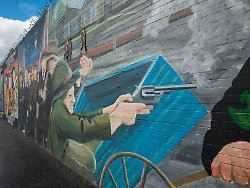Wednesday July 14, 2021
Johnson: Put an end to it
Northern Irish outraged about planned amnesty
The conflict in Northern Ireland determined people’s lives for decades – many families mourned the deaths and injuries. Therefore, there is now great outrage over the decision of the British Prime Minister Johnson to grant amnesty to many alleged perpetrators.
The survivors of victims of the civil war and political parties in Northern Ireland reacted outraged to an amnesty regulation by the British government for alleged perpetrators. With the historic move, the government wants to end the criminal prosecution of former soldiers for possible crimes during the decades-long civil war in the British province. It is about finally drawing a line, said Prime Minister Boris Johnson in Parliament in London. However, the regulation would also benefit paramilitaries such as ex-members of the terrorist organization IRA, as reported by the British media.
The five main parties in Northern Ireland – both supporters of the Union with Great Britain and supporters of reunification with the EU member Republic of Ireland – as well as the Irish government and victims’ organizations are all against the move. “Victims and survivors should not be treated like this,” said Wave, an organization that works with bereaved families. If the British government is serious about coming to terms with it, it must speak to those affected.
Bomb attacks and the Ballymurphy massacre
According to media reports, the bombings in two pubs in Birmingham, England, in 1974, with 21 dead and numerous injuries, which are attributed to the IRA, and the so-called Ballymurphy massacre in 1971, when British paratroopers shot ten unarmed civilians, are no longer being investigated. Most recently, two charges against British security forces had already been suspended for procedural reasons.
During the civil war in Northern Ireland, militant, mostly Catholic Republicans and British security forces, but also unionist, mainly Protestant paramilitaries, faced each other. Between the beginning of the 1970s and the conclusion of the Good Friday Agreement in 1998, a total of around 3,500 people were killed and tens of thousands were injured.
.
